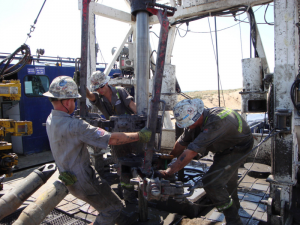
A while back we wrote a blog post on how to get an oilfield job with no experience. We have come to realize that a lot of you guys are interested in job hunting tips so we decided to write another article to help some of those that may be struggling to find jobs on limited-to-no experience. While you may seem stuck on the outside while those with previous experience are consistently getting called back to new jobs, remember that there is always a way to find a job. Everyone had to start somewhere and you’re no exception.
Before I start with specifics skills/attributes to talk about on your resume, I want to discuss a key mentality that’s going to separate those who get started in the oilfield industry and those who wind up going back to their day jobs. I believe the thing that is important above all else when applying for “roughneck” positions is:
Never get discouraged and keep applying, no matter how many times you’ve been rejected.
Time and time again I’ve seen people start with a burning motivation only to get completely and utterly grounded when they realize that nobody is replying back to them right away. Persistence to get the job done is a quality employers find extremely valuable in the oilfields so you need to embody that in your job search. No matter how hard it may seem, it’s important to keep your head up and your nose to the grind.
Now without further adieu, I present to you our resume tips for landing your ideal position as an oilfield worker:
State Your Previous Oilfield Experience:
This should come off as an absolute no-brainer, but I felt like I should put it on anyway. If you’ve ever had ANY kind of experience working in an oilfield environment put it on your resume. Whether you were a roughneck or a roustabout, don’t forget to updated your resume. No matter how brief or limited your experiences were, it’s important to account for every single second you spent on a rig on your resume. A little experience is better than none.
List Other Trade Jobs You May Have Had:
If you haven’t had the luxury of working in the field before (and were assuming many of you haven’t) no worries, there’s still hope. If you’ve ever had similar manual labor jobs where you’ve worked extensively with your hands, you’re going to want to emphasize skills you’ve learned from these jobs. Such jobs may include positions such as contractors, plumbers, mechanics and other trade jobs. Oilfield employers want to know that you’ve had experience working in physically demanding environments in the past.
They also want know you’ve been able to solve similar types of labor problems you might see in the oilfield. So if you’ve ever held one of these positions, don’t be afraid to go into extensive detail on your resume about it. Make an encompassing list of your duties and responsibilities and include those that will translate well to the oilfield on your resume. Such skills might be:
Ability to work long hours
Capable of thinking on your feet
Able to manage a high stress environment
Emphasize Your Ability To Learn On The Job
Sometimes out on the oilfield it feels like the events around you are going at about 100 miles an hour. Learning new skills in the fast paced environment can be overwhelming to say the very least. That’s why one of the key skills employers look for is the ability to learn things quickly in fast paced scenarios. The activities on a rig are constantly on the move and not many bosses are going to be thrilled if they have to wait around to teach you things that they already went over. Showing them on your resume that you pick things up quickly will put them at ease that you won’t be holding them when things need to get done.
Make Sure There Are No Spelling Mistakes
Just because your job will primarily value hands-on skills over grammatical knowledge doesn’t mean that you can ignore it on your resume. Oilfield employers will like to see that you pay close attention to detail as this will come in handy when working on a rig. Proper spelling and grammar also signals to them that you’re competent and will be able to understand what is needed to be done. If you realize you’re not getting any calls back, go back through your resume and double and even triple check it to make sure it’s completely error free. If need be, read it out loud to help catch any errors that you may be reading over.
Talk About The Importance Of Safety
While it may seem obvious that you don’t want to get yourself or anyone you’re working with injured, it’s certainly worth letting your employers know you understand just how important it is to them. Even just a few seconds of a lack of focus can lead to a careless mistake. In most other careers, careless mistakes are normally harmless and can be fixed. However, when operating the heavy machinery on rigs these mistakes could lead to a serious injury or worse. Oil drillers want to minimize the amount of liabilities they have running around including any careless workers.
Show Your Ability To Work Well With Others
Working on an oilfield is a team effort: plain and simple. You need to be able to effectively take orders from your superiors and communicate those orders to anyone else who needs to know. You’ll spend a lot of time with your team on the rig so it’s crucial that you’re able to develop a good working relationship with them. Show employers that you’re capable of doing this by highlighting situations in which you’ve worked with a team in the past. This also can tie really well if you’ve had any hands-on positions such as the ones mentioned above. Did you work on a construction team that was able to complete an office building? Or maybe you were part of an auto-mechanic team that completely restored a car. Try to recall instances like these and make sure you add them to your resume.
These are some of the qualities and skills that a lot of oilfield employers are going to find extremely enticing. When forming your resume, make sure you use a solid mix of these skills and that you’re not beating one of them to death with a stick. It’s important to show you’re balanced and understand all the facets of the industry.
If you have any more tips that you found useful to getting an oilfield job, please feel free to add them in the comments below!

